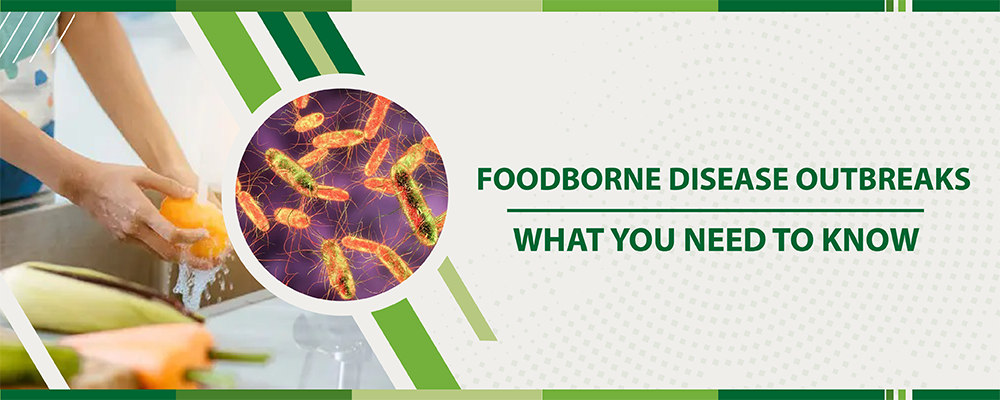- NATIONAL HELPLINE: 0800 012 322
- WHATSAPP NUMBER: 0600 123 456
- info@health.gov.za

A foodborne disease outbreak occurs when two or more individuals experience similar symptoms of illness, traced to a common contaminated food or beverage source. The contamination can result from harmful microorganisms (Bacteria: Salmonella, Listeria, E. coli, Viruses, Parasites, Toxins, Chemicals: Pesticides, Heavy metals, Cleaning agents) and Allergens. The cause may be infectious (microbial contamination) or toxin-related, making prevention and proper food handling critical to public health.
https://www.health.gov.za/food-control/
https://www.nicd.ac.za/diseases-a-z-index/foodborne-illness-and-gastroenteritis-outbreaks/
Below, we provide essential information about foodborne illnesses, how they are spread, common symptoms, and key actions you can take to protect yourself and others. Our goal is to increase awareness and empower you with knowledge on preventing foodborne illnesses.
Common Symptoms
Symptoms of an illness refer to the signs or manifestations that indicate the presence of a disease or health condition. These symptoms can vary greatly depending on the illness, but they typically involve changes in normal bodily functions or discomforts that alert a person that something is wrong. The following is a general description of symptoms foodborne illnesses:
• Nausea and vomiting
• Diarrhea (sometimes bloody)
• Abdominal cramps
• Fever
• Dehydration in severe cases
Key Messages
Key messages during an outbreak are crucial for ensuring effective communication, to provide facts to reduce confusion and encourage compliance with food safety requirements and preventive measures.
• Cleanliness is Key: Wash your hands, utensils, and surfaces frequently to prevent the spread of bacteria
• Cook Thoroughly: Ensure that food is cooked to the right temperature to kill harmful pathogens
• Chill Promptly: Refrigerate perishable foods to slow bacterial growth and reduce the risk of contamination
• Cross-contamination Prevention: Separate raw and cooked foods and always use separate utensils and cutting boards for different types of food
• Stay Informed: Stay updated on recalls and food safety news to avoid exposure to contaminated products
Investigating an Outbreak
Investigating an outbreak involves a systematic approach to identify, assess, and control the spread of an illness. This process is crucial for understanding the source of the outbreak, the affected population, and the factors contributing to the spread, so effective public health measures can be implemented. Here’s a general process for investigating an outbreak:
Detection:
• Identifying an unusual cluster of illnesses. This may be identified through surveillance systems, reports from healthcare providers, or public complaints.
Reporting:
• Health authorities and food safety agencies are notified about the outbreak promptly to trigger a formal response.
Investigation:
• Epidemiological: Identifying the source and mode of transmission
• Laboratory: Testing food, water, and stool samples
• Environmental: Inspecting food preparation and storage facilities
Control Measures:
• Recall of contaminated products
• Closure of affected food establishments
• Public health advisories to avoid certain foods
Prevention Strategies:
• Proper food handling and hygiene
• Thorough cooking and appropriate food storage
• Avoiding cross-contamination in food preparation areas
• Regular training for food industry workers
• Strengthening food safety regulations and inspections
Key Focus
The key messages shared on this page aim to prevent foodborne illnesses by emphasizing the importance of safe food handling, awareness, and hygiene practices. This section will encourage readers to take action such as practicing safe food handling, recognizing symptoms, and seeking medical help when necessary.
Key contact numbers